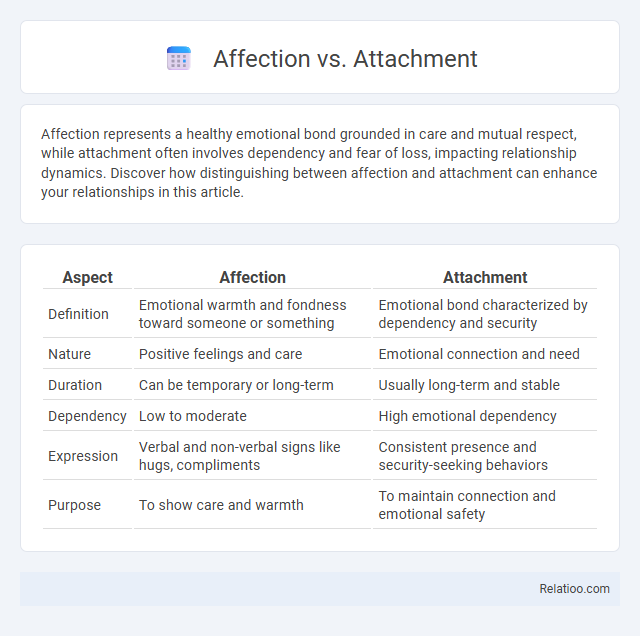Affection represents a healthy emotional bond grounded in care and mutual respect, while attachment often involves dependency and fear of loss, impacting relationship dynamics. Discover how distinguishing between affection and attachment can enhance your relationships in this article.
Table of Comparison
| Aspect | Affection | Attachment |
|---|---|---|
| Definition | Emotional warmth and fondness toward someone or something | Emotional bond characterized by dependency and security |
| Nature | Positive feelings and care | Emotional connection and need |
| Duration | Can be temporary or long-term | Usually long-term and stable |
| Dependency | Low to moderate | High emotional dependency |
| Expression | Verbal and non-verbal signs like hugs, compliments | Consistent presence and security-seeking behaviors |
| Purpose | To show care and warmth | To maintain connection and emotional safety |
Understanding Affection and Attachment
Understanding affection involves recognizing it as a genuine emotional expression of warmth, care, and fondness towards others, often characterized by positive physical touch and verbal affirmations. Attachment, in contrast, is a deep emotional bond that develops through consistent interaction and dependency, primarily rooted in psychological needs for security and connection, such as the caregiver-infant relationship. Differentiating affection from attachment is crucial for healthy relationships, as affection can exist independently and be transient, while attachment typically implies long-term emotional investment and reliance.
Defining Affection: Meaning and Characteristics
Affection is characterized by feelings of warmth, care, and positive regard directed towards someone or something, often expressed through gestures, touch, or words. Unlike attachment, which involves a deeper emotional bond and dependency, affection is more about showing kindness and appreciation without necessarily implying long-term commitment or need. Your ability to express affection enhances social connections and emotional well-being without the complexities of attachment or obsession.
What is Attachment? Concepts and Types
Attachment refers to the emotional bond formed between individuals, often characterized by a sense of security and dependence. It encompasses various types such as secure, anxious, avoidant, and disorganized attachments, each influencing how You relate to others and manage intimacy. Understanding these attachment styles is crucial for improving Your relationships and emotional well-being.
Emotional Differences: Affection vs Attachment
Affection involves positive feelings of warmth and care expressed toward others, often characterized by empathy and kindness without the need for dependency. Attachment is a deeper emotional bond rooted in security and reliance, often linked to trust and the need for closeness in relationships. Emotional differences between affection and attachment reveal that affection centers on voluntary expressions of love, while attachment emphasizes emotional dependency and comfort.
Psychological Foundations of Affection and Attachment
Affection and attachment are distinct psychological constructs with unique foundations; affection involves positive emotional expressions rooted in warmth and care, while attachment develops from early caregiver bonds fostering security and emotional dependence. Psychological theories highlight that affection promotes social bonding and emotional well-being through oxytocin release, whereas attachment patterns influence long-term relational behaviors based on childhood experiences. Understanding these differences enables your ability to nurture healthy emotional connections and recognize the impact of formative attachments on interpersonal dynamics.
The Role of Biology in Affection and Attachment
Biology plays a crucial role in shaping both affection and attachment through neurochemical processes involving oxytocin, vasopressin, and dopamine, which regulate emotional bonding and social connection. Affection typically arises from these hormonal influences promoting warmth and positive interactions, while attachment develops as a deeper, biologically-driven bond critical for survival and long-term relationships. The interplay of genetic predispositions and brain structures such as the hypothalamus and limbic system underpins how individuals experience and express both affection and attachment in diverse social contexts.
Manifestations in Relationships: How They Appear
Affection manifests in relationships through warm gestures, verbal expressions, and physical touch that convey love and care. Attachment appears as a deep emotional bond characterized by reliance, security, and a desire for closeness, often influencing behavior in times of stress or separation. Affection differs from attachment by being more about immediate positive feelings and expressions, while attachment involves long-term emotional dependence and stability.
Benefits and Challenges of Affection and Attachment
Affection fosters emotional well-being and strengthens interpersonal bonds by providing comfort and enhancing trust. Attachment, while crucial for forming secure relationships and promoting mental stability, can also lead to dependency and emotional vulnerability if not balanced. Both affection and attachment contribute to healthy social development but require mindful management to avoid challenges such as codependency or emotional burnout.
Impact on Mental Health and Well-being
Affection fosters positive emotions and strengthens mental health by promoting feelings of safety and belonging, while attachment, particularly secure attachment, provides a foundation for emotional resilience and well-being. Unhealthy attachment styles can contribute to anxiety, depression, and impaired self-esteem, negatively impacting your overall psychological state. Distinguishing between affection and attachment allows you to cultivate healthier relationships that support emotional balance and thriving mental wellness.
Cultivating Healthy Affection and Attachment
Cultivating healthy affection and attachment requires understanding their distinct roles: affection involves expressing warmth and care, while attachment forms secure emotional bonds essential for well-being. Your ability to balance these ensures emotional resilience and fosters trust in relationships. Prioritizing open communication and mutual respect strengthens both affection and attachment, promoting long-term psychological health.

Infographic: Affection vs Attachment
 relatioo.com
relatioo.com